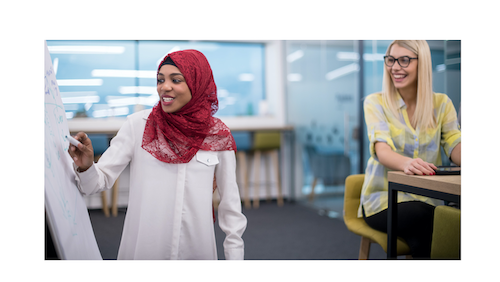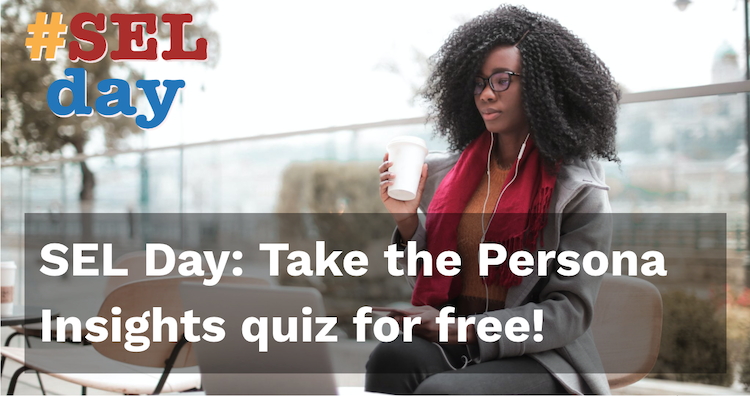Social-Emotional Skills for Better Lives
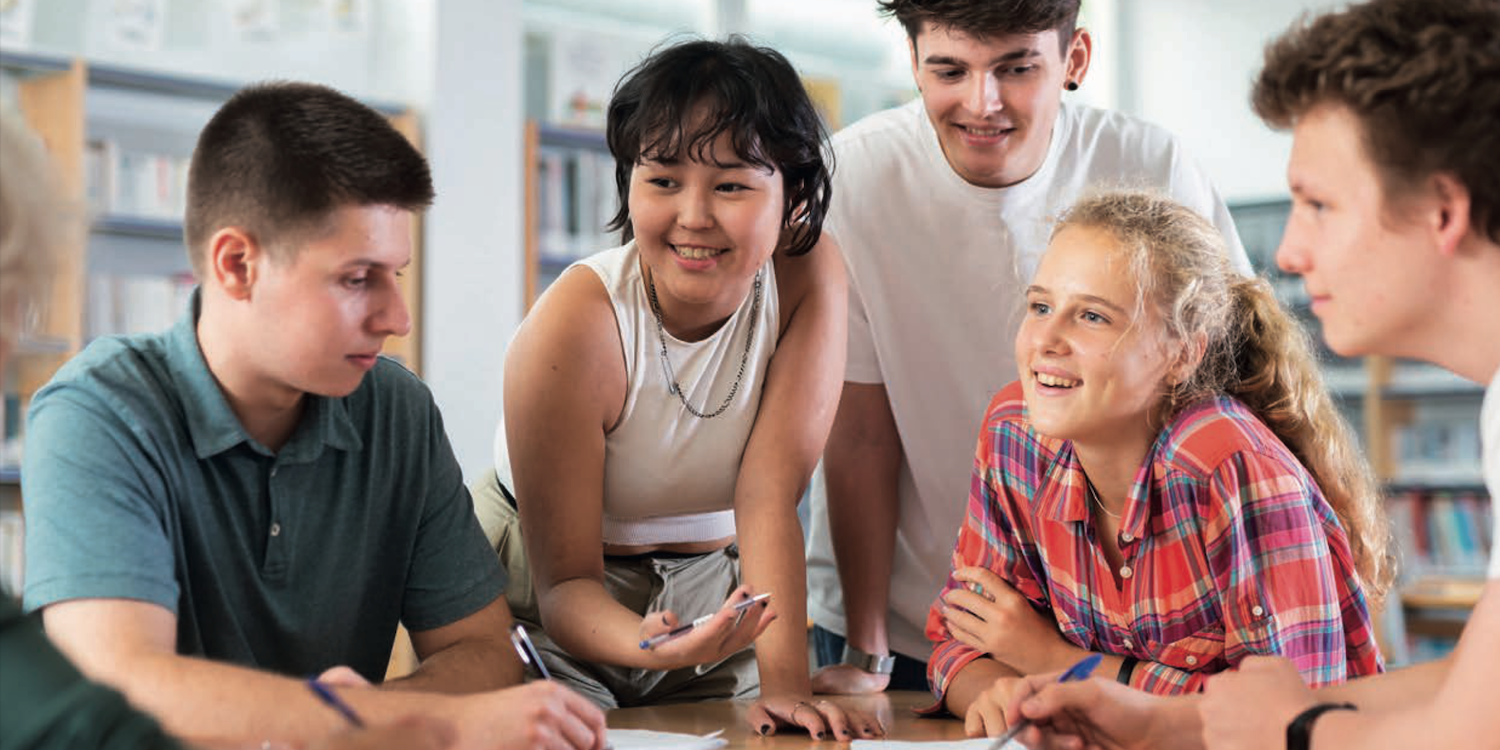
Image: OECD
Research from the OECD and the Nuffield Foundation shows that nearly all social-emotional skills are positively linked to students' academic performance, and they play an important role in academic attainment. It is now more important than ever for schools and colleges to invest in developing social-emotional skills for better lives, and that can generate a more than 10 x financial return on investment, while boosting academic attainment, wellbeing and school culture.
29-Aug-24
Dr Leila Khouja Walker (Chief Product Officer & Co-founder)
In April this year, the OECD published the results of its global 2023 Survey on Social-Emotional Skills, including that nearly all social-emotional skills are positively linked to students' academic performance. Around the same time the Nuffield Foundation released equally impactful research showing that in the UK, social-emotional skills play an important role in academic attainment.
In this blog I will highlight the key findings from these important pieces of research, illustrating why it is now more important than ever for schools and colleges to invest in developing social-emotional skills for better lives, and how that can generate a more than 10 x financial return on investment, while boosting academic attainment, wellbeing and school culture.
Let’s start with the OECD, who are arguably leading research into social-emotional skills with a global perspective. This is what they have to say about social-emotional skills:
“At a time where the kinds of things that are easy to teach and test have also become easy to digitise and automate, and where a multitude of disruptions require individuals to constantly learn, unlearn and relearn to find and adjust their place in life and work, individuals need to go beyond academic knowledge.
These are skills like cooperation, empathy, and creativity to find solutions, or the persistence to get things done despite challenges. Such social and emotional skills underpin our ability to interact with other people and manage our own emotions and behaviour in healthy and productive ways.”
 .
.
Even before the pandemic, self-reported wellbeing among teenagers was on the decline. COVID-19 made this even worse. A major OECD report published in 2021 confirmed previous research, showing 15 year-olds worldwide reporting – shockingly – 30% lower social-emotional skills than 10 year-olds.
This has a major negative impact, not only on student wellbeing, but also:
- On schools, with lower attainment and fewer leavers going on to higher education or good jobs
- On universities, with higher drop-out rates due to mental health issues and mismatched admissions
- And on employers, with lower productivity and retention caused by the skills gap
These problems will cost £9.8 trillion globally in the decade to 2030, according to EDT & Partners.
Social-emotional skills – also known as life skills, transferable skills, human skills or durable skills – have a beneficial effect on young people’s social learning and work-life outcomes.
For example:
- Up to 50% less bullying (Centre for Education & Youth)
- 10-20% higher academic attainment (Public Health England)
- More chance of getting a job with 93% of employers (ZipRecruiter)
These numbers are backed up by feedback from students using our social-emotional skills platform, Persona Life Skills:
“It's helped me to behave properly.”
– Student, age 15
“It increases my focus level, and patience level.”
– Student, age 13
“I learnt to find new ways of thinking and problem solving.”
– Student, age 18
Earlier this year the OECD updated their findings from the 2019 iteration of their global survey into social-emotional skills. It involved 14 countries worldwide. Let’s take an updated look at their global findings.
Decline in social-emotional skills during teenage years
There were a number of findings that we will delve into – but this one is worth highlighting first.
Major decline in social-emotional skills during teenage years
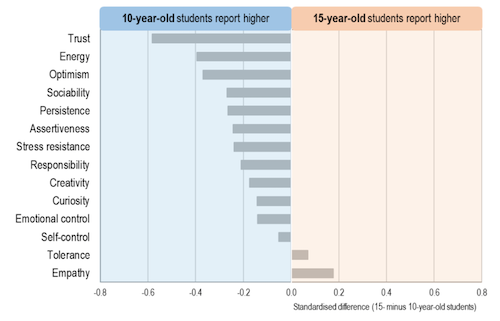
Image: OECD
The 2023 updated OECD survey repeated the finding from 2019, that the average 10 year old has lower social-emotional skills than the average 15 year old. Can you think of any other area of education where a decline in skill set would be seen? I can't! Which makes this finding truly worrying as it occurs during key teenage years when our children are trying to navigate changes that result in them becoming young adults.
Negative impact on life satisfaction
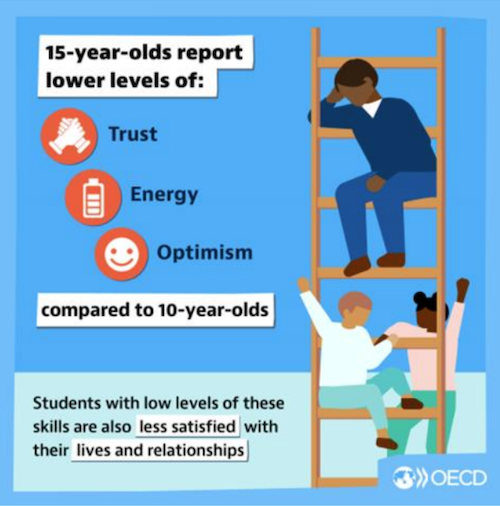
Image: OECD
15-year-olds report lower levels of trust, energy and optimism – these students are less satisfied with their lives and relationships.
Decline in social-emotional skills over time

Image: OECD
Where the OECD did a longitudinal comparison, the decline in social-emotional skills is getting worse when comparing data from the 2019 survey with the 2023 survey. This is especially true for 15 year-olds, who spent some of their most formative years when they were 12-14 dealing with COVID and repeated lockdowns. Curiosity, creativity and tolerance were highlighted as three skills where average scores have dropped the most over time.
Let’s look into some more findings from the OECD survey.
Social-emotional skills linked with academic performance
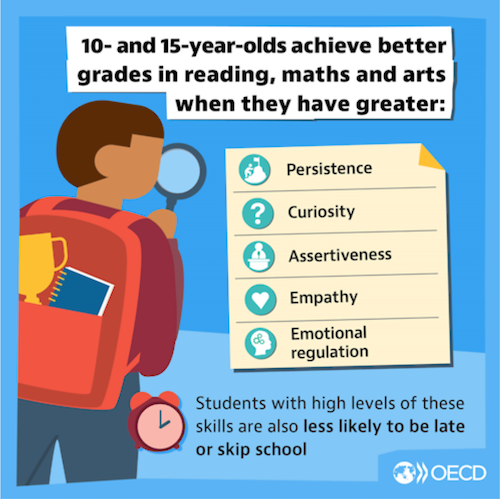
Image: OECD
Both 10 and 15 year olds do better academically when they have greater social-emotional skills such as persistence, curiosity, assertiveness, empathy and emotional regulation. Of interest to schools and colleges tackling persistent absenteeism – a hangover from COVID – is that students with high levels of these skills are also less likely to be late or skip school.
Teenagers are ambitious!
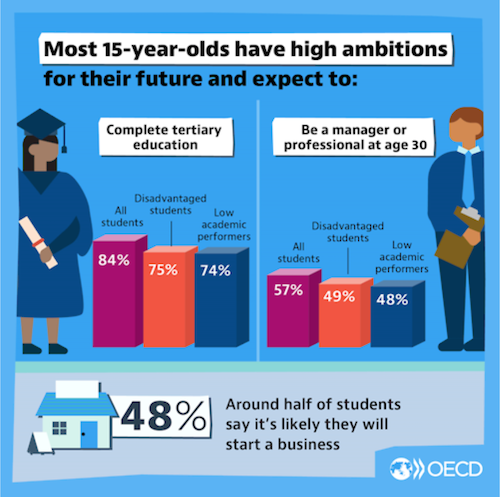
Image: OECD
Most 15 years olds have high ambitions for their future and expect to complete tertiary education or be a manager or professional by the age of 30.
The relevance of academic performance here is notable. In terms of ambition and future expectations, there’s a 10% gap between the average and students with low academic performance. And that is just their own perception, which may well be optimistic.
But look at the 48% reporting that it is likely they will start a business! We know from the business community that social-emotional skills are seen as essential skills for successful employment. In fact 8 out of 10 employers say social-emotional skills are the most important skills, World Bank research has found.
This especially applies to adaptability, resilience and communication skills. And that is even more true for aspiring entrepreneurs.
Girls suffer more academic anxiety than boys

Image: OECD
More data from the OECD survey showed that on average, girls report less stress-resistance, and experience more test and class anxiety, than boys. The infographic illustrates the gender gap per country, with Finland showing the largest gender gap and Japan the smallest.
The OECD’s extensive PISA research shows that boys outperform girls in mathematics in 40 countries, but girls outperform boys in 17 countries. However the good news is that academic gender gap is slowly narrowing over time.
Most students are sleep poor

Image: OECD
More than half of 15 year-old students get less than eight hours sleep most nights. And of course we all know that lack of sleep impacts students performance and concentration in class.
A socio-economic skills gap

Image: OECD
Finally from the OECD research, students from disadvantaged backgrounds report lower levels of ALL social-emotional skills compared with their advantaged peers.
The gap is greatest for creativity, tolerance and assertiveness.
Social-emotional skills help with COVID-19 learning loss
The OECD are not the only credible research organisation carrying out research in this field. What is interesting is the similarity between findings from different organisations. In their report A Generation At Risk – Rebalancing Education in the Post-Pandemic Era, the Nuffield Foundation focused on the impact of COVID-19 and how education can recover or rebalance in the years that follow.
 .
.
Here is a summary of their findings:
“Our international review suggests that children suffered significant Covid learning loss – up to 6 months – with children from low-income backgrounds experiencing an extra 2 months of learning loss. Children also suffered a significant decline in socio-emotional skills. These 2 factors combined to limit pupils’ emerging development at every life stage. Covid amplified long term persistent education gaps across a range of OECD countries.
Compared with most other nations, England’s pandemic response was heavily focused on academic catch-up with less emphasis on socio-emotional skills, extracurricular support and wellbeing.
Our results suggest that to improve child outcomes, much greater emphasis is needed in schools on activities that improve both socio-emotional and cognitive skills.”
Some additional findings from the Nuffield Foundation report found that 20% of the highest performing pupils in cognitive tests who had average social-emotional skills at age 14 fail to attain 5 good GCSEs, showing that social-emotional skills can make all the difference in academic outcomes.
Social-emotional skills more impactful for girls
There appears to be a gender divide in the importance of social-emotional skills.
 .
.
The Nuffield Foundation reports that for girls social-emotional skills are 50% more impactful in determining their GCSE results than cognitive skills. Whereas, for boys cognitive skills are twice as important as social-emotional skills.
Over 10 x financial ROI from social-emotional skills programmes
Let me finish off on this tour of recent research with a deeper look into the financial gains that are to be made from implementing social-emotional skills programmes.
 .
.
Columbia University’s Center for Benefit-Cost Studies in Education has carried out an economic evaluation of six common social-emotional programmes. They concluded that the return on investment was on average 11 dollars for each dollar spent. That's more than a ten times return!
Here are the social-emotional programmes they cost evaluated:
- 4Rs – Learning and literary program
- Positive Action – Activities promoting positive thinking
- Life Skills Training – Intervention for substance abuse/violence
- Second Step – Improving problem- solving and emotional management
- Responsive Classroom – Improve teacher efficacy on social-emotional skills
- Social-Emotional Training – Intervention supporting cognitive and social-emotional competencies
They calculated costs for each intervention by adding up staffing, resources and facility costs then calculating in many cases the cost savings due to the benefits of these interventions.
For example, savings came from fewer missed school days and therefore need to provide extra academic support. Also, reduced staffing time for addressing student problems and critically, fewer mental health interventions.
As we’ve seen in other research, another indirect financial benefit is that with improved academic attainment comes the ability of the student to earn a higher income over their lifetime.
It bears repeating: The financial benefits of Social-Emotional Learning programmes outweigh their costs by more than 1,000 percent. If you are experiencing financial constraints on implementing social-emotional learning, share this evidence with your senior leadership decision-makers!
What can be done?
The OECD make several recommendations based on their research. Here are some that we've picked out:
1. Measure students’ social and emotional skills to identify disparities between students and changes in levels of skills over time. (If you want to find out more about measurement, download our white paper on student personal development.)
2. Build students’ social and emotional skills to reduce disparities, as efforts are made to reduce disparities in academic outcomes.
3. Ensure social and emotional learning is accessible and effective for all student groups.
4. Target support to students identified with particular social and emotional needs – or implement universal approaches.
5. Help students identify strengths and areas of growth. (Our free Persona Inights personality quiz is a great way to do that.)
6. Recognise adolescence as a sensitive development period.
7. Support students with the transition from primary to secondary education.
How we can help
The presented evidence speaks for itself and is highly convincing. Let me finish by sharing some insight into how our social-emotional learning and personal development platform for teenagers, Persona Life Skills, addresses students' and schools' needs.
Persona Life Skills is a cost-effective way any school, teacher or tutor can get started with social-emotional skills development, or augment an existing programme with our unique personality insights approach that students love.
"I benefited a lot from Persona. It gave me love for myself"
– Student, age 14
It works equally well in the classroom, blended learning or remote learning. Built-in teacher resources and guidance mean any teacher can easily get started and facilitate the learning. It’s our unique personality insights approach that makes Persona Life Skills special.
Knowing yourself first, and then understanding what makes other people tick, both accelerates and improves the acquisition of important Life Skills.
Students not only develop these critical social-emotional skills, they also gain certification of evidence for their learning outcomes.
If you enjoyed this article you might also like:
White paper: 2024 Guide to Student Personal Development in Secondary Schools and Colleges
Life Skills in the Curriculum – 10 Habits for Developing Social-Emotional Skills in Every Classroom
Delivering the Social-Emotional Element of Student Personal Development
Persona Education offers free access to its Persona Life Skills online learning platform for secondary schools and colleges interested in developing their pupils’ social-emotional life skills, to boost wellbeing, academic and employability outcomes.
About the author:
Dr Leila Khouja Walker has been working in the education sector for 25 years. An ex-teacher and pastoral deputy head, she is now a respected edtech and pedagogy thought leader, leading development of the personality insights powered personal development platform Persona Life Skills, at the Bristol based edtech company Persona Education Ltd.
persona-life.com





